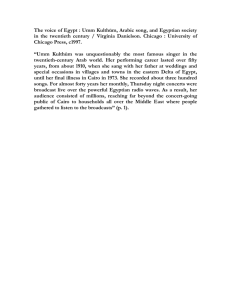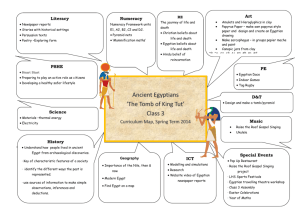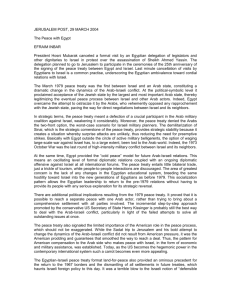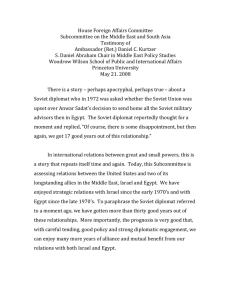Don`t Make Egyptian Upheaval About Washington
advertisement
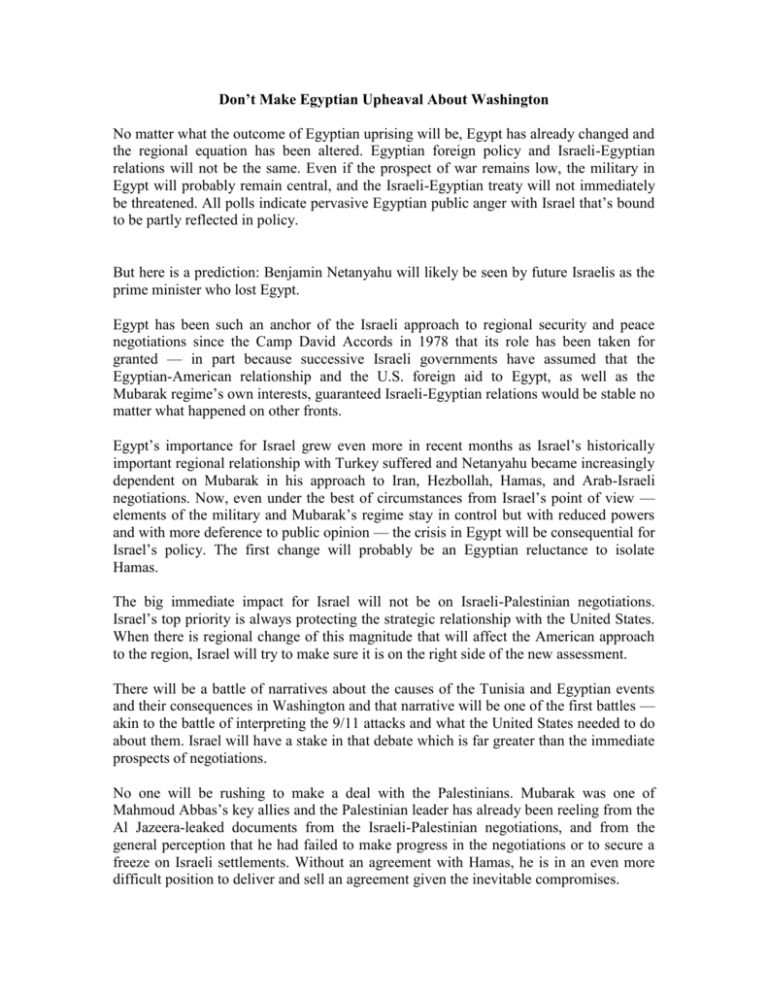
Don’t Make Egyptian Upheaval About Washington No matter what the outcome of Egyptian uprising will be, Egypt has already changed and the regional equation has been altered. Egyptian foreign policy and Israeli-Egyptian relations will not be the same. Even if the prospect of war remains low, the military in Egypt will probably remain central, and the Israeli-Egyptian treaty will not immediately be threatened. All polls indicate pervasive Egyptian public anger with Israel that’s bound to be partly reflected in policy. But here is a prediction: Benjamin Netanyahu will likely be seen by future Israelis as the prime minister who lost Egypt. Egypt has been such an anchor of the Israeli approach to regional security and peace negotiations since the Camp David Accords in 1978 that its role has been taken for granted — in part because successive Israeli governments have assumed that the Egyptian-American relationship and the U.S. foreign aid to Egypt, as well as the Mubarak regime’s own interests, guaranteed Israeli-Egyptian relations would be stable no matter what happened on other fronts. Egypt’s importance for Israel grew even more in recent months as Israel’s historically important regional relationship with Turkey suffered and Netanyahu became increasingly dependent on Mubarak in his approach to Iran, Hezbollah, Hamas, and Arab-Israeli negotiations. Now, even under the best of circumstances from Israel’s point of view — elements of the military and Mubarak’s regime stay in control but with reduced powers and with more deference to public opinion — the crisis in Egypt will be consequential for Israel’s policy. The first change will probably be an Egyptian reluctance to isolate Hamas. The big immediate impact for Israel will not be on Israeli-Palestinian negotiations. Israel’s top priority is always protecting the strategic relationship with the United States. When there is regional change of this magnitude that will affect the American approach to the region, Israel will try to make sure it is on the right side of the new assessment. There will be a battle of narratives about the causes of the Tunisia and Egyptian events and their consequences in Washington and that narrative will be one of the first battles — akin to the battle of interpreting the 9/11 attacks and what the United States needed to do about them. Israel will have a stake in that debate which is far greater than the immediate prospects of negotiations. No one will be rushing to make a deal with the Palestinians. Mubarak was one of Mahmoud Abbas’s key allies and the Palestinian leader has already been reeling from the Al Jazeera-leaked documents from the Israeli-Palestinian negotiations, and from the general perception that he had failed to make progress in the negotiations or to secure a freeze on Israeli settlements. Without an agreement with Hamas, he is in an even more difficult position to deliver and sell an agreement given the inevitable compromises. The U.S. will undoubtedly have to re-assess its policies. Washington can exploit the uncertainty to put together a comprehensive plan that can refocus regional attention on diplomacy — but the risks of failure may be too much to handle. It can also sit back until things settle down but that may be seen as support for Israel and play into the hands of angry publics. It can pursue a policy less focused on immediate results and more on the sort of principles of foreign policy— human rights and international law — that inspired the hopes of many around the world in the first months of the Obama administration. But it is impossible to put any new initiative in place before deciding how to interpret the regional events and deciding how to deal with them.




